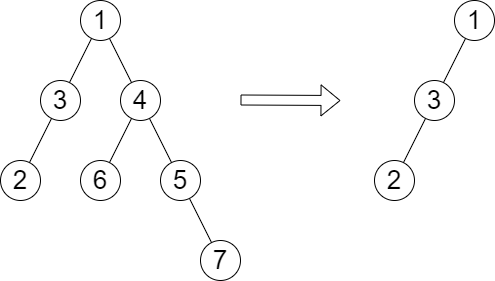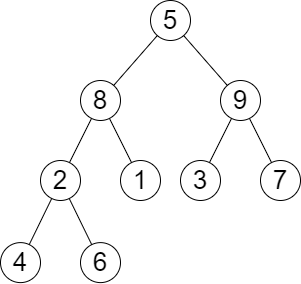2024-10-26 Daily Challenge
Today I have done leetcode's October LeetCoding Challenge with cpp.
October LeetCoding Challenge 26
Description
Height of Binary Tree After Subtree Removal Queries
You are given the root of a binary tree with n nodes. Each node is assigned a unique value from 1 to n. You are also given an array queries of size m.
You have to perform m independent queries on the tree where in the ith query you do the following:
- Remove the subtree rooted at the node with the value
queries[i]from the tree. It is guaranteed thatqueries[i]will not be equal to the value of the root.
Return an array answer of size m where answer[i] is the height of the tree after performing the ith query.
Note:
- The queries are independent, so the tree returns to its initial state after each query.
- The height of a tree is the number of edges in the longest simple path from the root to some node in the tree.
Example 1:

Input: root = [1,3,4,2,null,6,5,null,null,null,null,null,7], queries = [4] Output: [2] Explanation: The diagram above shows the tree after removing the subtree rooted at node with value 4. The height of the tree is 2 (The path 1 -> 3 -> 2).
Example 2:

Input: root = [5,8,9,2,1,3,7,4,6], queries = [3,2,4,8] Output: [3,2,3,2] Explanation: We have the following queries: - Removing the subtree rooted at node with value 3. The height of the tree becomes 3 (The path 5 -> 8 -> 2 -> 4). - Removing the subtree rooted at node with value 2. The height of the tree becomes 2 (The path 5 -> 8 -> 1). - Removing the subtree rooted at node with value 4. The height of the tree becomes 3 (The path 5 -> 8 -> 2 -> 6). - Removing the subtree rooted at node with value 8. The height of the tree becomes 2 (The path 5 -> 9 -> 3).
Constraints:
- The number of nodes in the tree is
n. 2 <= n <= 1051 <= Node.val <= n- All the values in the tree are unique.
m == queries.length1 <= m <= min(n, 104)1 <= queries[i] <= nqueries[i] != root.val
Solution
/**
* Definition for a binary tree node.
* struct TreeNode {
* int val;
* TreeNode *left;
* TreeNode *right;
* TreeNode() : val(0), left(nullptr), right(nullptr) {}
* TreeNode(int x) : val(x), left(nullptr), right(nullptr) {}
* TreeNode(int x, TreeNode *left, TreeNode *right) : val(x), left(left), right(right) {}
* };
*/
class Solution {
using pi = pair<int, int>;
vector<vector<pi>> maxHeightSubTree;
map<int, int> level;
int generateInfo(TreeNode *root, int lv = 0) {
if(!root) return -1;
level[root->val] = lv;
while(maxHeightSubTree.size() <= lv) {
maxHeightSubTree.push_back({});
}
int leftLevel = generateInfo(root->left, lv + 1);
int rightLevel = generateInfo(root->right, lv + 1);
int maxLevel = max({lv, leftLevel, rightLevel});
maxHeightSubTree[lv].push_back({maxLevel, root->val});
// cout << root->val << ' ' << maxLevel << endl;
return maxLevel;
}
void sortLevels() {
for(auto &maxHeights : maxHeightSubTree) {
sort(maxHeights.begin(), maxHeights.end(), greater<pi>());
}
}
public:
vector<int> treeQueries(TreeNode* root, vector<int>& queries) {
generateInfo(root);
sortLevels();
vector<int> answer;
answer.reserve(queries.size());
for(auto query : queries) {
int lv = level[query];
if(maxHeightSubTree[lv].size() == 1) {
answer.push_back(lv - 1);
} else if(maxHeightSubTree[lv][0].second == query) {
answer.push_back(maxHeightSubTree[lv][1].first);
} else {
answer.push_back(maxHeightSubTree[lv][0].first);
}
}
return answer;
}
};